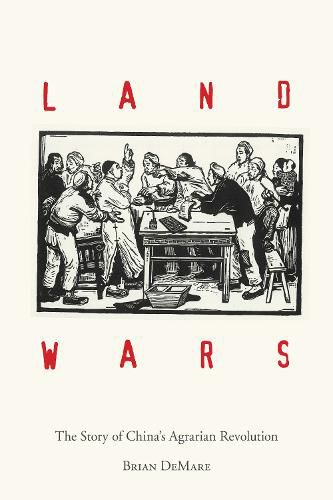Readings Newsletter
Become a Readings Member to make your shopping experience even easier.
Sign in or sign up for free!
You’re not far away from qualifying for FREE standard shipping within Australia
You’ve qualified for FREE standard shipping within Australia
The cart is loading…






Mao Zedong’s land reform campaigns comprise a critical moment in modern Chinese history, and were crucial to the rise of the CCP. In Land Wars, Brian DeMare draws on new archival research to offer an updated and comprehensive history of this attempt to fundamentally transform the countryside. Across this vast terrain loyal Maoists dispersed, intending to categorize poor farmers into prescribed social classes, and instigate a revolution that would redistribute the land. To achieve socialist utopia, the Communists imposed and performed a harsh script of peasant liberation through fierce class struggle. While many accounts of the campaigns give false credence to this narrative, DeMare argues that the reality was much more complex and brutal than is commonly understood-while many villagers prospered, there were families torn apart and countless deaths. Uniquely weaving narrative and historical accounts, DeMare powerfully highlights the often devastating role of fiction in determining history. This corrective retelling ultimately sheds new light on the contemporary legacy of land reform, a legacy fraught with inequality and resentment, but also hope.
$9.00 standard shipping within Australia
FREE standard shipping within Australia for orders over $100.00
Express & International shipping calculated at checkout
Mao Zedong’s land reform campaigns comprise a critical moment in modern Chinese history, and were crucial to the rise of the CCP. In Land Wars, Brian DeMare draws on new archival research to offer an updated and comprehensive history of this attempt to fundamentally transform the countryside. Across this vast terrain loyal Maoists dispersed, intending to categorize poor farmers into prescribed social classes, and instigate a revolution that would redistribute the land. To achieve socialist utopia, the Communists imposed and performed a harsh script of peasant liberation through fierce class struggle. While many accounts of the campaigns give false credence to this narrative, DeMare argues that the reality was much more complex and brutal than is commonly understood-while many villagers prospered, there were families torn apart and countless deaths. Uniquely weaving narrative and historical accounts, DeMare powerfully highlights the often devastating role of fiction in determining history. This corrective retelling ultimately sheds new light on the contemporary legacy of land reform, a legacy fraught with inequality and resentment, but also hope.